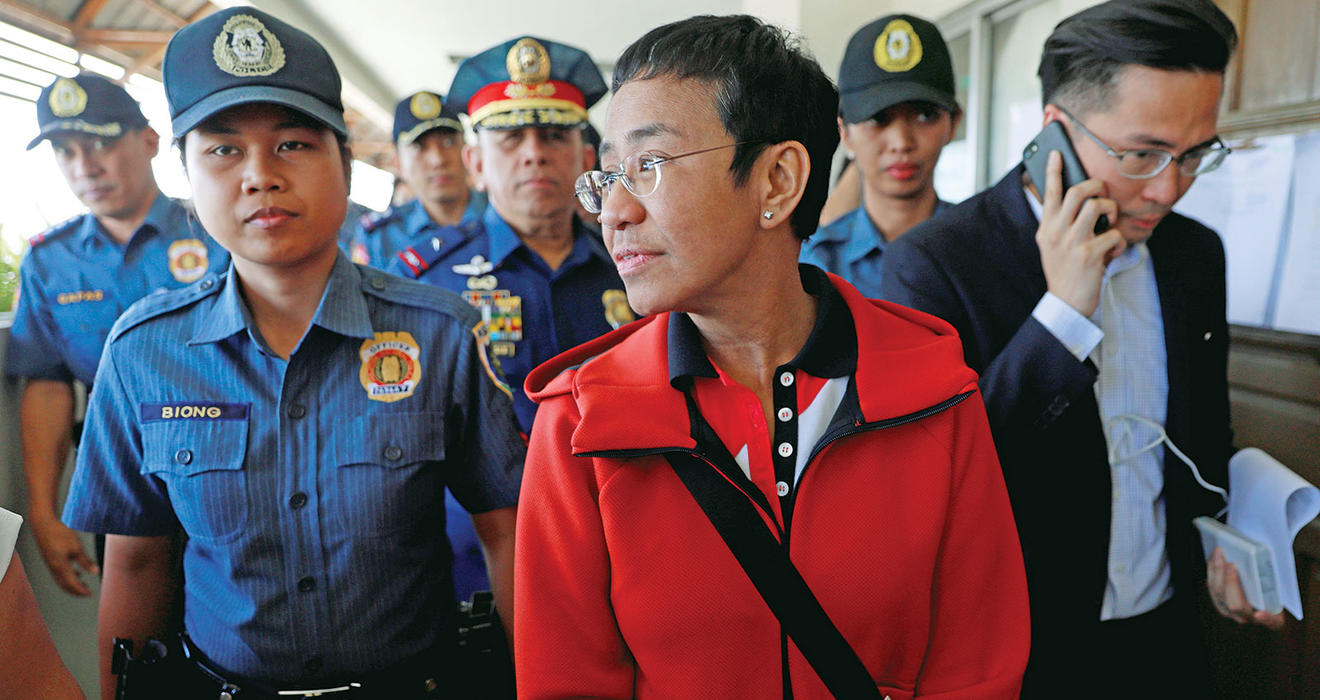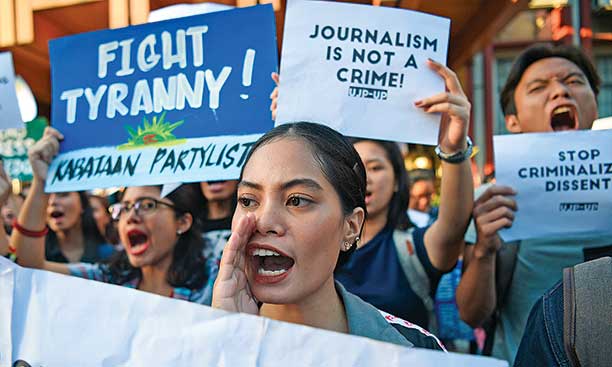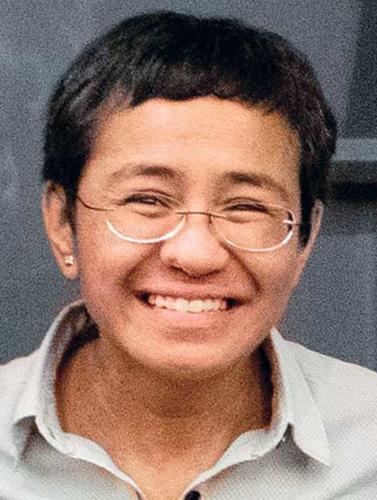
My phone vibrated, and I looked down: “We posted bail. You have no arrest warrant, but you have to be prepared for the worst.” It was a text from one of our founders, Glenda Gloria. She and five of our board directors were in court on a trumped-up criminal charge to intimidate Rappler, the news site we founded, to silence.
It was 10 p.m. March 27, 2019. I had just finished speaking at the Google News Initiative about how our business at Rappler pivoted to survive attacks by the Philippine government. The attacks had started online — a social-media campaign that grew quickly and exponentially — and by October 2016, I was getting an average of 90 hate messages per hour. That was followed a year later by the weaponization of the law. In 2018, the government filed nearly a case a month against me and our little news startup, which continued winning investigative journalism awards globally.
We just kept doing our jobs: Now more than ever, the mission of journalism is critical.
I had already been arrested a month earlier. Then, the government agents timed it so that I couldn’t post bail and had to spend the night in detention. These petty moves only showed me a blatant abuse of power and made me more determined to shine the light — the only weapon journalists have against oppression.
I was checking in at the San Francisco airport for my direct flight home to Manila.
Then I received a message from my lawyer, outlining for us the worst case I needed to mentally prepare for: “1. Law enforcers will enter the plane and get Maria before passengers are off-loaded; 2. After arrest, Maria will not go through immigration and will be taken out of the airport to a detention center; 3. Arresting officers will confiscate her phone, and she will not be able to communicate with any of us; 4. Maria will be detained indefinitely and will have no access to us.”
I dealt with this by rationalizing: At this point, there wasn’t even an arrest warrant.
Half an hour before courts closed in Manila — just as the plane doors closed — my lawyer sent a message that kept me awake most of the 13-hour flight home: “The judge issued the arrest warrant. Prepare to be arrested.”
What would you sacrifice for the truth?
It’s a question all of us have to answer, because as the Philippines has proven, democracy crumbles fast. In our case, it took less than six months from the time the attacks against Rappler began on social media in 2016 to the severe erosion of our national values and the collapse of the independence of our institutions.
I came face to face with this question when Time magazine named the Persons of the Year in 2018 — the “Guardians of Truth.” There were four magazine covers showing different journalists: those murdered at the Capital Gazette in Maryland; Jamal Khashoggi, dismembered in the Saudi consulate in Istanbul; the two Reuters journalists then jailed in Myanmar ... and me. I found out about it on Twitter — and I sent it to our social-media team to check because I thought it was “fake news.” Then CNN called, and my stomach sank. I realized I was the only one of those pictured who was then both alive and free.
The Philippine government filed 11 charges against me — from securities fraud to tax evasion to cyber libel. Within about three months, I posted bail eight times.
I’ve done nothing wrong but be a journalist.
All we lived through at Rappler forced us to draw the line. Three years ago, we demanded an end to impunity on two fronts: first, for Facebook, which is essentially our internet, and for the information operations that were replacing facts with lies — our democracy’s death by a thousand cuts. The second was President Rodrigo Duterte’s drug war: The Philippines admits to killing about 6,000 people in police operations, but human-rights groups and the United Nations say that number is at least 27,000 and climbing.
Demanding an end to impunity for our government and one of the most powerful American companies forced us to define exactly what we’re willing to sacrifice for the truth.
Like some of my freedom. In order to travel, we’ve had to post more than $60,000 in bail and bonds — significantly more than Imelda Marcos, who has been convicted in courts in at least four countries around the world. Once courts approve my travel, I can’t change any of it without getting approval again.
When Amal Clooney became my lawyer, she told me that I could go to jail for 63 years. Still, I have it better than others. There’s The Washington Post’s Jason Rezaian, jailed in Iran for 544 days. I talked to him about what he lived through. He gave me his book, and I tried to imagine what living through this would be like. One detail stood out: In order to remain strong, he exercised by walking, but his cell was so small he had to walk in a circle. After a year and a half of the mental uncertainty, his body learned habits — and after he was released, he found himself in a mall ... walking around in a circle.
And then there was Daphne.
Daphne Caruana Galizia was killed by a car bomb in Malta a little more than two years ago. She worked on exposing cronyism and corruption among Malta’s political and business elite. That her family continues to fight for justice inspires me (we share a lead counsel, Caoilfhionn Gallagher). For years before this, her government subjected her to threats and intimidation and painted her as an “enemy of the people” — tactics that are all too familiar to me.
Among the first on the scene after her car exploded near their driveway was her son Matthew, a Pulitzer Prize-winning journalist. After my first arrest, he told me I reminded him of his mom. Just as with Time magazine, I didn’t know how to feel.
The Philippine government filed 11 charges against me in a little more than a year — from securities fraud to tax evasion to cyber libel.
Every report on press freedom globally has dismal findings: Freedom House chronicles the downward spiral over more than a decade; Reporters Without Borders shows how fear has increased because authoritarian regimes use technology to incite hatred against journalists. The Committee to Protect Journalists’ 2019 Global Impunity Index said the Philippines had the most unsolved journalist killings.
November 2019 marked the 10th anniversary of the Ampatuan massacre, what CPJ then called the worst mass killing of journalists in history. Fifty-eight journalists, support staff, and campaign volunteers were killed in broad daylight by the private army of the Ampatuan family, which controlled Maguindanao Province in the Philippines. The bodies were buried in a mass grave with a government-owned backhoe.
As I write this, a verdict in the Ampatuan trial is expected soon. The victims’ families’ lawyer told us that press freedom would be dead if the Ampatuans were not convicted.
Press freedom is the foundation of every other freedom guaranteed in our democracies. Now more than ever, we know information is power. Now more than ever, we need the rule of law.
This is an existential moment not just for journalism but for democracies around the world.
The battle for truth is the battle of our generation. With technology as the accelerant, populist leaders are getting elected around the world, hijacking and transforming democracies — all learning from what now seems to be a dictator’s playbook. It’s simple.
A lie told a million times becomes a fact.
Without facts, we don’t have truth.
Without truth, there is no trust.
Without all three, democracy as we know it is dead.
My adrenalin was pumping when we landed, and the plane door opened. I turned on Facebook Live on my cellphone and began broadcasting as I walked from the chute to the airport. That was when police officers came to get me: two women at the lead. One pulled me aside and began reading me my rights. I looked around and there were at least six other officers, including the man who seemed to be their supervisor.
They asked me to put my coat over my hands. I asked why. Their protocol said they should handcuff me, but they didn’t want to. I told them I wasn’t going to pretend. After a short discussion, the group escorted me through immigration and baggage claim, my hands uncuffed.
When I got in the van, I saw six officers in SWAT gear, all fully armed. When one of the women officers held my head as I entered the van, I pushed back. Then I tried to calm down. What I have learned through all this is anger management.
This is the battle for truth. Hold the line. What we do now matters.
We journalists can’t do this alone.
So ask yourself again: What are you willing to sacrifice for the truth?
Then do it.








4 Responses
stevewolock
5 Years AgoVia Instagram: From Essay to Embroidery
Textile artist Diana Weymar ’91, profiled in PAW’s Jan. 8 issue for her collective art project documenting the Trump presidency, found inspiration while reading the magazine. She stitched these words from Maria Ressa ’86’s essay on journalism and the “battle for truth” in the Philippines. The quote “jumped out at me,” Weymar explained in an email. It wasn’t her first work with a Princeton thread: Past pieces include quotations by Joyce Carol Oates and Toni Morrison and an 11-page sampler of wisdom from John McPhee ’53.
Cherry
6 Years AgoA Chilling Story
Although I know the whole story as an enlightened and critical-thinking citizen, this whole article still sent chills down my spine and tears down my cheeks. I thought my country had seen the end of a dictatorship era when, as a 21-year-old college graduate, I joined a people power uprising and successfully threw Mr. Marcos out from his 20-year seat of power. It does not seem so these days! I pray for more courage for you, Ms. Ressa, and determined international support, please, for the long haul you will be in! Congratulations for the many recognitions bestowed on you for your work!
Reese Horton Jr. ’69
6 Years AgoTaking a Stand
Wow, what courage! Thanks for a taste of what it takes to stand up to tyranny.
Kiki Loomis ’86
6 Years AgoClass of '86 Supports Classmate Maria Ressa
Maria Ressa is an extraordinary example of Princeton in the nation's -- and world's -- service. Anyone who knows Maria like me is not surprised that she has put her principles before her own safety and security. She is probably the last person who would have expected to be in the position of having to defend democracy, not only in the Philippines but indeed globally, as the insidious and sinister forces that are at work in the Philippines are also at work here in the U.S. and in other even more fragile democracies around the world.
As with most of my classmates, my first question was, how can I help? Well, in partnership with the Committee to Protect Journalists (CPJ), the Press Freedom Defense Fund is collecting funds for the defense and other related expenses which exceed $40,000 a month. This is part of the Duterte strategy, to throw up costly barriers to self-defense, so your support is more than just helpful -- it is a direct rejoinder to the cynical ploy of the regime to weaken and ultimately quell the forces of truth.
https://support.pressfreedomdefensefund.org/donate/pfdf
Maria's and Rappler's cause is our cause. Let's treat it like the existential threat it is.
On behalf of the Great Class of '86,